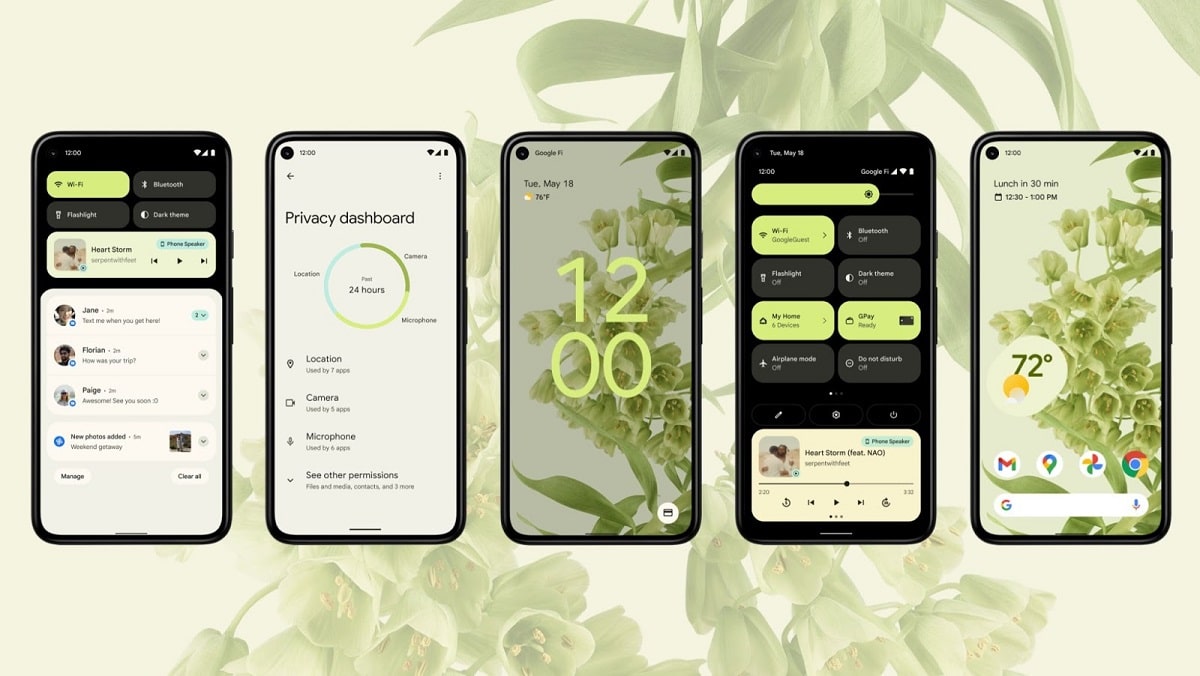
Google has presented the first beta version of Android 12 in which a number of interface design updates have been proposed most important in the history of the project. The new design implements the concept "Material You" touted as the next generation of Material Design.
The new concept it will be applied automatically to all platforms and interface elements, and it will not require any changes from the application developers.
On the platform itself, a new widget design is highlighted as they have been made more visible, corner rounding has been improved, and the ability to use dynamic colors to match the system theme has been provided.
Added the ability to automatically adapt the system palette to the selected wallpaper color: the system automatically detects the predominant colors, adjusts the current palette, and applies changes to all interface elements, including the notification area, lock screen, widgets, and volume control.
New animated effects have been implemented, such as gradual scaling and smooth movement of areas when scrolling, appearing, and moving items on the screen. For example, when you cancel a notification on the lock screen, the time indicator automatically expands and takes up the space previously occupied by the notification.
It is also highlighted that added the effect of stretching scrolling edges, which makes it clear that the user has exceeded the scroll limit and has reached the end of the content. With the new effect, the image of the content is stretched and recovered. The new scroll end indication mode is on by default, but there is an option in the settings to revert the old behavior.
Smoother sound transitions have been implemented- When switching from one sound-emitting app to another, the sound of the former is now quietly muted and the latter is gently raised, without imposing a sound on the other.
In addition, a significant optimization of the system performance was carried out: the load on the CPU of the main system services decreased by 22%, which in turn led to an increase in battery life by 15%. By reducing lock contention, reducing latency, and optimizing I / O, you improve performance of transitions from one application to another and shorten application startup time.
Database query performance improved by using inline optimizations in the CursorWindow operation. For small amounts of data, CursorWindow is 36% faster, and for sets with more than 1000 rows, the acceleration can be up to 49 times.
The hibernate mode of the application, which allows, if the user has not explicitly interacted with the program for a long time, automatically reset the permissions previously issued to the application, stop the execution, return the resources used by the application, such as memory, and block the launch of background jobs and the sending of push notifications.
Added a BLUETOOTH_SCAN permission separate to scan nearby devices via Bluetooth. Previously, this opportunity was provided when there was access to information about the location of the device, which led to the need to provide additional permissions for applications that need to pair with another device via Bluetooth.
In the second beta version, the Privacy Panel is expected to appear with an overview of all the permission settings, allowing you to understand what data an application user has access to). Microphone and camera activity indicators will be added to the panel, with the help of which you can also forcibly turn off the microphone and camera.
Finally, the launch of Android 12 is expected in the third quarter of 2021.
From the ready-made firmware builds of this beta release, they are offered for Pixel 3/3 XL, Pixel 3a / 3a XL, Pixel 4/4 XL, Pixel 4a / 4a 5G and Pixel 5 devices, as well as for some ASUS, OnePlus devices , Oppo, Realme, Sharp, TCL, Transsion, Vivo, Xiaomi and ZTE.
Source: https://android-developers.googleblog.com
It is good that you talk about android (for those who are interested in continuing to be a slave), but taking into account the theme of the blog, it would be much better if you talk about news of real linux smartphones, as well as its software, which is having interesting news, from which you do not report. A clear example is the web https://linuxsmartphones.com
regards